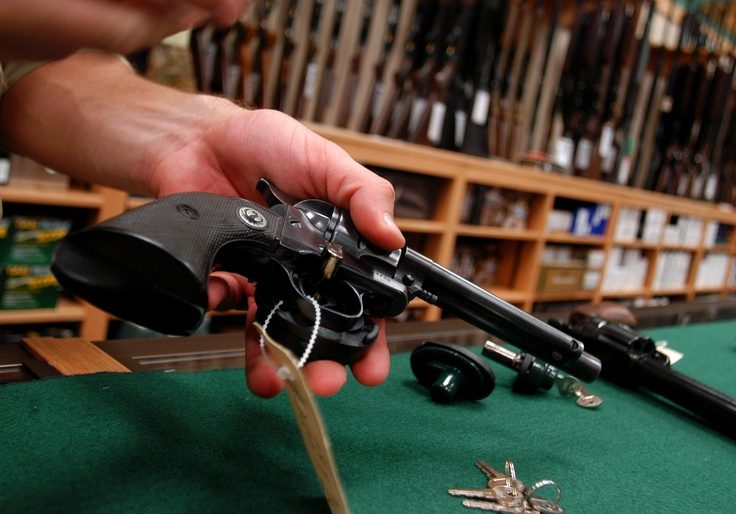The Pennsylvania Supreme Court on Sunday night denied an emergency request that would have blocked a gubernatorial order mandating the closure of gun retailers in response to the novel coronavirus.
The order to shut down gun stores was part of a larger plan set forth by the state's Democratic governor, Tom Wolf, mandating the closure of businesses not deemed "life-sustaining." Gun-rights advocates asked the state's Supreme Court to block the order as it applied to gun retailers, but the seven-member court denied the request.
The court's decision comes as Pennsylvanians and Americans more broadly have flooded gun stores. Industry officials said sales had spiked as much as 300 percent last week due to concerns of relaxed law enforcement during the outbreak and some retailers even reported running out of stock—at least temporarily. While the first states to implement aggressive shutdown measures have split on whether they would include gun stores, the country's top gun-rights groups have threatened more legal action.
The governor's order went into effect on Monday as a result of the court's decision. It is unclear how long the order will remain in place.
In a dissent joined by two other justices, Justice David Wecht said the order, as written, represented an "impermissible intrusion upon a fundamental constitutional right," pointing to other industries that have been exempted from the shutdown. Wecht said Wolf's order should be amended to accommodate the constitutionally protected firearms industry in the same way the governor has accommodated the restaurant industry.
"In my view, it is incumbent upon the Governor to make some manner of allowance for our citizens to continue to exercise this constitutional right," Wecht said, arguing gun stores could be permitted to operate on a limited basis. "Such an accommodation may be effectuated while preserving sensible restrictions designed to slow the spread of COVID-19, but nonetheless provide a legal avenue for the purchase and sale of firearms, thus avoiding an impermissible intrusion upon a fundamental constitutional right."
The majority is not required to explain its denial and did not provide its reasoning in this case.
Adam Kraut, a lawyer representing the plaintiffs in the case and the director of legal strategy for the Firearms Policy Coalition, said he was unhappy with the court's decision.
"I am disappointed the Pennsylvania Supreme Court declined an opportunity to protect the fundamental rights of all Pennsylvanians during this time of uncertainty, when many are deciding that the ability to defends one's home and family is more necessary than ever," he told the Washington Free Beacon. "The Governor's Order amounts to an absolute and indefinite prohibition on the acquisition of firearms by citizens of the Commonwealth. Such a prohibition cannot withstand constitutional scrutiny and directly infringes upon the core of the Second Amendment."
Kraut said gun stores are vital to the ability of Pennsylvanians to exercise their rights because retail buyers must physically pick up firearms purchased from licensed gun dealers in person, even if they have purchased the weapon from an online retailer.
"Pennsylvanians cannot simply order a firearm online and enjoy home delivery, or curbside service, as many first-time gun buyers are finding out. Their politicians have been lying to them," he said.
The plaintiff's case centered around whether or not the pandemic qualified as a disaster under Pennsylvania law and, if it did, whether using the law to close gun stores violated both state and federal constitutional protections. Gov. Wolf argued that he does have the power to close gun stores on an emergency basis and the order "does not abridge the right to bear arms" because "it merely suspends—temporarily—a variety of stores from acting as centers of contagion."
States operating under shutdown orders have split on whether or not the restrictions apply to gun stores. In Illinois, for example, gun stores have been allowed to stay open. In California and New Jersey, they have been ordered to close.
On Monday, the Second Amendment Foundation and the New Jersey Second Amendment Society filed suit against that state's ban.
"In order for New Jersey residents to purchase firearms they must go through a licensed firearms retailer and pass a background check," Alan Gottlieb, the Second Amendment Foundation's founder, said in a statement. "However, [Democratic governor Phil] Murphy's order was subsequently followed by a notice posted on the State Police website that the agency is no longer conducting background checks. Gov. Murphy cannot simply suspend the Second Amendment."
The National Rifle Association and National Shooting Sports Foundation have also threatened to file suit over gun-store closures.
Plaintiffs in the Pennsylvania case are now considering what to do next, which could include an emergency appeal to the United States Supreme Court.
"We're evaluating our options," Kraut said.
